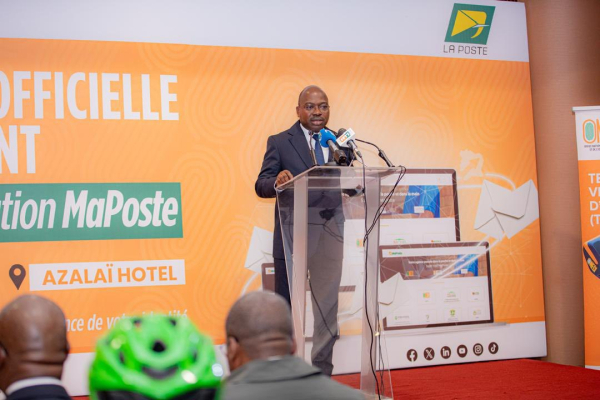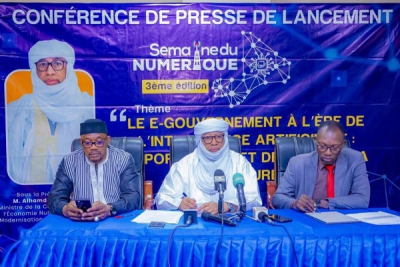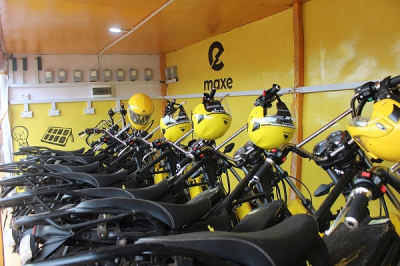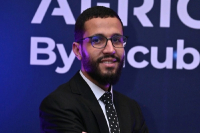- Ivorian startup Tuzzo centralizes social media sales through a single mobile application.
- The platform has recorded more than 10,000 downloads on Android since its 2023 launch.
- Tuzzo raised $871.2 million in 2024 to expand beyond Ivory Coast into francophone markets.
Tuzzo is a digital solution developed by a young Ivorian startup. Founders Ali Ouattara and Fabrice Tra launched the platform in Abidjan in 2023 to address a major constraint in local commerce: limited access to integrated digital tools for selling on social media and managing business operations efficiently.
The solution offers a mobile application available on iOS and Android, where it has recorded more than 10,000 downloads, according to Play Store data. After account creation, users centralize sales channels such as Facebook, WhatsApp, Instagram, and TikTok within a single interface. As a result, the platform reduces operational fragmentation and simplifies the management of sales, promotions, and customer relationships.

In practical terms, sellers can create product catalogs, track orders, analyze performance metrics such as profits and best-selling items, and launch targeted promotional campaigns. The application delivers these functions through an intuitive interface designed for African market conditions. Consequently, the platform lowers barriers to digitalization for small merchants, regardless of their financial capacity to invest in complex technological solutions.
Tuzzo emerged from the observation that social media platforms have become essential commercial storefronts in Africa, while many merchants lack tools to channel, centralize, and optimize their sales. In 2024, the startup raised $871.2 million in a funding round led notably by Ring Capital and Mstudio. The company plans to use the funds to accelerate technology development, improve user experience, and expand beyond Ivory Coast into other francophone markets.
This article was initially published in French by Adoni Conrad Quenum
Adapted in English by Ange Jason Quenum
- Ivory Coast launched the MaPoste application to link digital identity with postal and administrative services.
- ONECI integrated the National Register of Natural Persons into La Poste’s digital platform.
- The initiative aims to reduce travel, speed up procedures, and strengthen transaction security.
Ivory Coast continues to modernize its public administration through digital tools. On Friday, January 16, 2026, the National Office of Civil Status and Identification (ONECI) and La Poste de Côte d’Ivoire launched “MaPoste,” an application designed to dematerialize access to postal and administrative services through digital identity.
Designed as a “super application,” MaPoste allows every citizen holding a National Identification Number (NNI) to access a digital mailbox from a smartphone. The tool aligns with the national digital transformation strategy, which aims to bring public services closer to users while strengthening the security of exchanges.
Through this platform, La Poste de Côte d’Ivoire adopts a so-called phygital approach by combining a physical network of more than 200 agencies with fully digital services. The initiative seeks to reduce travel, streamline procedures, and improve user experience at a time when demand for digital public services continues to rise.
The project relies on the integration of the National Register of Natural Persons (RNPP), which ONECI manages. The system assigns each citizen a unique identity based on biometric data and serves as a central pillar of Ivory Coast’s e-government development. Authorities state that linking digital services to a certified identity remains a key condition to ensure transaction reliability and protect personal data.
In practical terms, MaPoste aims to facilitate several administrative procedures, including the delivery of national identity cards and the request and tracking of official documents such as civil status certificates, nationality certificates, and criminal records. The initiative seeks to reduce processing times and strengthen procedural traceability.
More broadly, the initiative fits into Ivory Coast’s wider push to digitize public services. In recent years, the country has multiplied projects around digital identity, cybersecurity, and administrative dematerialization, with the ambition to build a public administration that operates more efficiently, includes more citizens, and adapts better to digital usage.
This article was initially published in French by Samira Njoya
Adapted in English by Ange Jason Quenum
Mali’s Minister of Communication, Digital Economy, and Modernization of Administration, Alhamdou Ag Ilyène, has announced the launch of Digital Week, scheduled for January 29-31, 2026, in Bamako. Themed "E-Government in the Era of Artificial Intelligence," this year’s event will feature Burkina Faso and Niger as guests of honor, with a core focus on Sahelian cooperation, cybersecurity, and digital innovation.
Nigeria’s Metro Africa Xpress (MAX) has secured $24 million in debt and equity to bolster its electric vehicle (EV) financing across West and Central Africa. This fresh capital will support fleet expansion, the rollout of battery-swapping stations, and the company's regional growth.
Nigerian fintech Cardtonic has raised $2.1 million to scale Pil, a standalone expense management platform tailored for African startups and SMEs. Designed as a comprehensive financial operating system, Pil will offer virtual dollar cards, multi-currency funding, and real-time expense tracking, marking Cardtonic’s strategic shift from consumer services to the B2B market.
- Rank targets individuals and small businesses seeking structured, long-term financial discipline through technology.
- The fintech offers multiple savings products alongside instant payments and bill management.
- Founder Femi Iromini previously worked with the World Bank and led an education-to-employment startup.
Femi Iromini is a Nigerian entrepreneur and the co-founder and chief executive officer of Rank, formerly known as Moni. Rank operates as a community-based fintech that develops financial products for African small businesses and individuals seeking to build wealth.
Founded in 2020, Rank positions itself as a financial application for ambitious users who want to save more effectively, manage spending efficiently, and grow within a goal-oriented community. The company aims to make prosperity more accessible by creating links between users who aspire to advance financially and those who already master savings discipline.
Rank offers several savings mechanisms. The first product, called “Reserve,” allows users to set aside funds securely for a fixed period while earning regular returns. The second product, “Flex,” provides greater liquidity by allowing users to withdraw funds at any time without forfeiting interest.
The platform also offers “Goals,” a savings product designed to finance clearly defined projects through targeted contributions. In addition, Rank provides a “Premium” offering for users managing larger balances or building long-term wealth, with higher interest rates and priority support.
Beyond savings, Rank integrates payment and expense management features. Users can send and receive money instantly at any time and pay multiple bills, including electricity, cable television, internet, and other services, through a single interface.
Before launching Rank, Femi Iromini founded Lead360HQ in 2017. The organization partnered with African universities to help students convert academic training and personal ambition into concrete career opportunities. He served as chief executive officer of Lead360HQ until 2019.
Femi Iromini graduated from Obafemi Awolowo University in Nigeria, where he earned a bachelor’s degree in geophysics in 2012. He later worked as a consultant for the World Bank from 2019 to 2021.
This article was initially published in French by Melchior Koba
Adapted in English by Ange Jason Quenum
- Senegalese entrepreneur Stéphane Mancabo co-founded Yello to shift baccalaureate revision toward daily, low-pressure learning.
- The Yello app offers offline-accessible, modular content and uses gamification to encourage consistency.
- Founded in 2023, the startup targets structural gaps in exam preparation through digital tools.
Stéphane Mancabo, a Senegalese entrepreneur, serves as co-founder and chief executive officer of Yello. The startup aims to turn baccalaureate preparation into a daily process that feels simpler, smoother, and less anxiety-inducing for high school students.
Founded in 2023, Yello operates as an educational application that delivers structured content designed around students’ real-life constraints. The platform provides audio lessons, written texts, and concise summaries, allowing users to choose learning formats that suit their preferences. The company designs the content to improve comprehension, reduce technical jargon, and guide students progressively toward baccalaureate requirements.
Students can download courses, which allows them to revise without continuous internet access. Yello avoids intensive or overwhelming study methods and instead emphasizes gradual learning. The app organizes content into short, targeted modules that focus on specific concepts rather than entire chapters. This structure seeks to establish steady progress without making students feel overloaded.
Yello uses reminder notifications to structure students’ work and encourage continuous revision rather than last-minute cramming. The application also integrates gamification features. Users earn points, unlock progress badges, and rank on national or school-level leaderboards. The system includes rewards and prizes designed to recognize consistency and sustained engagement.
On the academic and professional front, Stéphane Mancabo earned a bachelor’s degree in microfinance in 2018 from the Catholic University of West Africa (UCAO) in Cameroon. He began his career in 2017 as business development director at T’es de Dakar (TDD), a digital media outlet.
From 2020 to 2021, he worked as production project manager at Walabok Studio. At the same time, he appeared as a technology news presenter on Télévision Futur Média. He later joined WURUS LAB, an audiovisual production company, where he served as production director until 2023.
This article was initially published in French by Melchior Koba
Adapted in English by Ange Jason Quenum
- Moroccan startup Woliz raised $2.2 million to scale its retail digitization platform
- The solution uses AI and connected devices to modernize small shops
- Partnerships with Visa and Attijari Payment support digital payment adoption
Woliz is a digital solution developed by a Moroccan startup that connects small neighborhood retailers to the digital economy by giving them access to tools usually reserved for large retail chains. Based in Casablanca, the startup was launched in 2025 by Kamal Hardouzi, Ismail Amri, Othmane Jabrane, and Karim Hamri. In December 2025, it announced the successful completion of a $2.2 million funding round to support its growth.
At the core of Woliz’s offering is an application combined with artificial intelligence technologies and connected terminals that allow retailers to manage their businesses more efficiently. These tools cover sales tracking, inventory management, automated ordering, acceptance of digital payments, and access to financial services through banking partners. This integrated approach also promotes financial inclusion for small retailers, who are often excluded from formal financial systems.
Woliz goes beyond the digitization of individual points of sale. The platform operates as an intelligent ecosystem linking retailers, distributors, major fast-moving consumer goods brands, financial institutions, and service providers. This interconnection helps reduce operating costs and creates new economic opportunities for traditional retailers.
At the same time, the startup has formed strategic partnerships with Attijari Payment and Visa to facilitate the transition to modern, secure, and inclusive payment methods. The three-way partnership aims to expand the use of digital payments while adapting to local market realities.
By combining artificial intelligence, data analytics, fintech, and retail technology, Woliz offers small retailers a new path toward a connected, competitive, and sustainable neighborhood commerce model in an increasingly digitalized economy.
Adoni Conrad Quenum
-
Omar Saleh co-founded Khazna, a fintech platform targeting underbanked salaried workers in Egypt and the Middle East.
-
The app allows employees to access part of their salary in advance and pay bills directly via mobile.
-
Khazna partners with employers and merchants to reduce reliance on informal borrowing and traditional banks.
Omar Saleh, an Egyptian entrepreneur now based in Riyadh, Saudi Arabia, serves as co-founder and chief executive officer of Khazna. The fintech startup targets underbanked populations in Egypt and, more broadly, across the Middle East.
Founded in 2019, Khazna develops a mobile application that helps employees manage their money on a daily basis. The platform delivers simple and fast financial services directly through smartphones.
Khazna integrates multiple features designed to meet common household needs. The app seeks to replace or complement processes usually handled through banks, retailers, or utility billing companies.
One of Khazna’s core services provides salary advances, primarily for employees of partner companies. This feature allows workers to instantly access a portion of the following month’s salary through the app.
The service aims to reduce reliance on informal loans from family members or colleagues when unexpected expenses arise before month-end.
Khazna also relies on a network of partner merchants where users can make immediate purchases with deferred payment options. The platform further allows users to finance purchases made at other retailers while defining flexible and simplified repayment terms.
In addition, the application integrates a bill payment service, enabling users to settle recurring expenses directly from their mobile devices.
Omar Saleh graduated from Cairo University in 2005 with a bachelor’s degree in chemical engineering. He later earned an MBA in 2014 from Stanford Graduate School of Business in the United States.
He began his professional career in 2005 at BG Group in the oil and gas sector as a senior project engineer. In 2010, he joined Dow Chemical as commercial manager for Africa. Three years later, he became an investment banking associate at J.P. Morgan in the United States.
Between 2016 and 2019, Saleh served as strategy director at Advanced Energy Systems (ADES), an energy sector company. He rejoined ADES in 2022 as a member of the audit committee, a position he held for two years.
This article was initially published in French by Melchior Koba
Adapted in English by Ange Jason Quenum
-
Algerian engineer Aymen Hamidi founded Kabas to deploy field-oriented artificial intelligence in heavy industry.
-
Kabas develops two core products, DALILE and Virtual Lab, to turn industrial data into operational decisions.
-
The company targets industrial efficiency gains while keeping full control over data and infrastructure.
Aymen Hamidi, a mining engineer by training and an Algerian entrepreneur, founded and leads Kabas, a technology company that integrates artificial intelligence to transform and optimise industrial processes.
Founded in 2023, Kabas positions itself as a deep-tech company that places AI at the service of heavy industries while ensuring full control over data and infrastructure. The company bases its offering on a pragmatic vision of artificial intelligence built around two complementary products: DALILE and Virtual Lab.
DALILE operates as an intelligent assistant dedicated to industrial knowledge. The system explores and exploits large volumes of technical documents and complex datasets, and it deliberately distances itself from consumer chatbots. The solution relies on a set of specialised agents that share analytical tasks, cross-check information, and deliver structured answers from simple queries written in everyday language.
Virtual Lab complements this approach by addressing another critical industrial challenge: the transition from idea to experimentation. The platform simulates scenarios before laboratory tests or pilot-scale trials by adjusting formulations, process parameters, or operating conditions. Teams can compare options, measure the impact of decisions, and identify the best balance between performance and cost without immobilising equipment or consuming raw materials. Connected to DALILE, Virtual Lab uses knowledge extracted from company data to further refine analysed scenarios.
On the academic and professional front, Aymen Hamidi earned a mining engineering degree in 2023 from the National Polytechnic School of Algeria. He completed several internships in the mining sector, including at ENOF Spa and SOMIPHOS, where he worked on extraction sites and phosphate processing plants. In 2022, he joined Sonatrach as a geophysics engineering intern, before completing a two-month laboratory engineering placement in 2023 at Drilling Fluids Services aux Puits (DFSP).
This article was initially published in French by Melchior Koba
Adapted in English by Ange Jason Quenum
More...
-
Burundi lawmakers unanimously approved a law regulating the collection, processing, and use of personal data amid accelerating digitalisation.
-
The legislation creates an independent data protection authority and introduces criminal penalties for violations.
-
The reform aligns Burundi with African and international digital governance standards and supports rollout of a biometric national ID.
Burundi adopted a dedicated legal framework for personal data protection as lawmakers moved to secure the country’s digital transformation and strengthen citizen trust.
Members of the National Assembly meeting in plenary session on Thursday, January 15, in Kigobe unanimously adopted a bill governing the collection, processing, and exploitation of personal data, as public administration and services expand digital systems.
Données personnelles : le Burundi verrouille l’ère numérique
— Irebe FM (@IrebeFM) January 15, 2026
Une Assemblée en mode responsabilité
L’Assemblée nationale s’est réunie ce 15 janvier 2026, au Palais des Congrès de Kigobe, sous la présidence de Daniel Gélase Ndabirabe, afin d’analyser et d’adopter le projet de loi… pic.twitter.com/NRu0IhKEsK
The Ministry of Interior, Community Development, and Public Security sponsored the law to close a legal gap created by the rapid spread of digital tools across government, the private sector, and daily life. Authorities expanded computerized systems, digitised the voter register, and advanced the rollout of a biometric national identity card, which together increased the production of sensitive data that existing Burundian law regulated weakly.
The law establishes core principles for privacy protection and emphasizes respect for fundamental rights and freedoms. It introduces multiple data protection regimes and creates an independent administrative authority responsible for enforcement, which aligns Burundi’s framework with international standards for digital governance.
On the operational front, the legislation introduces specific criminal penalties for violations, complementing existing cybercrime provisions. Lawmakers framed these measures as essential to restoring public confidence in digital systems, as parliamentary debates highlighted concerns over data security and misuse.
Beyond the national context, the reform fits within a broader continental push. The African Union has promoted legal harmonisation through the Malabo Convention on cybersecurity and personal data protection. About 39 African countries have already adopted dedicated data protection laws, while several others continue legislative reviews.
In Burundi, the new framework should also remove a key obstacle to deploying the biometric national identity card. Authorities said technical milestones already include installing registration software aligned with the new administrative boundaries. Officials currently test the system in about a dozen pilot communes before a phased nationwide rollout.
This article was initially published in French by Samira Njoya
Adapted in English by Ange Jason Quenum
Ghana-based Stars From All Nations (SFAN) has secured a grant from the British Council Ghana to train 100 creative entrepreneurs. Through its ReadyforWork platform, SFAN will offer training in business and digital skills to help young talent build sustainable companies. Applications for the program are open through Friday, January 30.
Nigerian fintech Paycrest announced a $404,000 funding round on Tuesday to build out its decentralized settlement layer. By linking stablecoins with fiat in emerging markets, Paycrest is making cross-border payments faster and more compliant. Having already undergone real-world testing, the platform offers a resilient payment infrastructure designed specifically to navigate local constraints.
Egypt’s MoneyHash has teamed up with Spare to bring Pay-by-Bank options to UAE merchants. By reducing costs and accelerating settlements, the collaboration promises a more seamless checkout experience. The move is a key step in MoneyHash’s mission to scale open banking and modernize the Middle East’s payment landscape.















